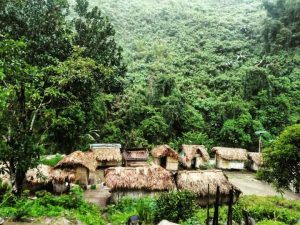
Cordillera Administrative Region- Barangay Baliwanan is one of the farthest barangays in Kabugao, Apayao. One can reach it by hiking for about four to five hours via Barangay Kumao or by a motorboat until Barangay Tuyangan, followed by a two to three hours of hike, but to take latter would mean paying a certain amount in thousands.
Baliwanan is considered a Geographically Isolated and Disadvantaged Area (GIDA) in Kabugao. Crossing multiple rivers and walking pass dangerously high trails to reach the barangay is a common scene among its residents. This is also true even within the barangay as sitios are too far from the “centro” where the Baliwanan Elementary School and the health center are located.
But there is a different story during the rainy season as the rivers’ current rise in volume and strength, and the trails become slippery. Travelling becomes dangerous especially for children who have to go to school.
With this, most of the parents would rather hold back their children from going to school when it rains. It is a good thing if an adult accompanies and looks after the children as they go to school. But this does not lessen the threat of the long and arduous footpath to school. With this, attendance of children in school during rainy season is usually at its lowest rate that forces the school to cancel classes. As a result, children take remedial classes to catch up with the missed lessons. Unlike regular classes, topics are compressed during remedial classes making learning more challenging for the children.
Parents have become restless and more so for the teachers since the situation affects the children’s learning. Teachers have observed the increase in the number of students in the area with difficulty in reading. They claim this as one of the leading factors in the decline in the preparation of children for higher level of education. It even affects the compliance of children beneficiaries being monitored in the Pantawid Pamilyang Pilipino Program (Pantawid Pamilya) that leads to the non-payment of their education grants. Teachers consider these situations during Compliance Verification but the direct effect to the children cannot be denied. Some children even become disinterested to go to school and end up dropping out.
For a long period of time, this has been an unsolvable problem since the community cannot do anything with their geographical situation. But the Pantawid Pamilya beneficiaries, who were most affected by the situation suggested to build huts for their children.
Building not just huts, but homes
There were existing huts in the area. But in 2010, parents school children and then barangay officials decided to build additional huts and repair the existing huts as well. The pupils’ huts were built in between the school and the teachers’ quarters. Around 25 parents worked together to put up the huts. Every year, parents of pupils who intend to use the huts also take part in maintaining these.
“Aside from giving free service, parents also bring in materials which are used in building and repairing the huts. They usually use indigenous materials that they can get from the field or from the mountains”, Pantawid Pamilya Project Development Officer Michael Matekyeng said.
After planning, the beneficiaries started to collect materials that they can muster without expense. They even agreed on the schedule of work. They knew that they will have to work for days without any salary, but that did not become an issue. They also contributed for the food and snacks of the workers. The father grantees were the ones who went out to get bamboos and other materials for the huts while the mothers prepared for the meals and snacks.
Both worked to build the little huts for the children in their barangay who want to attend school and visit the health center without thinking about the risk of losing their lives and missing out their classes. Children from afar no longer need to go through dangerous trails nor cross rivers on a daily basis as they can just stay in the huts during school days.
“Dakkel nga tulong kadagiti ubbing ta han da mabannog nga kara apan skwela ken magawid. Makasrek da iti skwela on time ken mababantayan pay ti teachers ta kaaruba da met tay hut ti teachers ([The huts] are of big help to the children because they will no longer get tired going to school and back home. They can now go to school on time while being looked after by their teachers since they are just near their huts.),” Josephine Vidal, a parent, said.
Aside from getting rid of the threats to the children’s safety, the children also learned to be responsible in making their huts into their own homes. As time passed, they got used to live on their own with the guidance of the teachers and parents who visits the children once or twice a week.
The huts can be compared to student dormitories. The pupils also have access to basic facilities. Around 20 pupils are now staying in the Baliwanan Pupil’s huts.
Preparing for a better future
Because of the huts, the school attendance has greatly improved and dropouts were lessened as well. The children’s compliance to education became better as the amount of unpaid education grants became smaller.
“Haanen nga mairason iti ubing ken parentes nga haan makasrek iti ubing da gapo ta adayo (Children and parents can no longer use the distance an excuse to not got to school.)”, Pantawid Parent Leaders Lily and Sylvia said.
“We are elated to know that the parents of our Pantawid Pamilya children are recognizing the importance of sending their children to school as they have done their part to help address the problem on absenteeism and dropping out of school. We are also grateful for the collaboration that the teachers, parents, and children did. This is one way of helping the children build a better future by going to school and by being responsible individuals”, DSWD-CAR Regional Director Janet P. Armas said.
Indeed, when everyone disregard their differences and focus on a common goal, great things can be achieved. It is not about what one can do to solve a problem but about what all can do to change the world. If one does not move to put an end to one of the main reasons of poverty, then poverty will continue to remain not only in the family but also in the community. Our simple efforts to help our children grow up well and finish school can be the start not only to change our life & our children’s life, but also the society’s future. #DSWD-CAR, SOCIAL MARKETING UNIT, Municipal Action Team-Kabugao, Apayao and Nerizza Faye G. Villanueva




